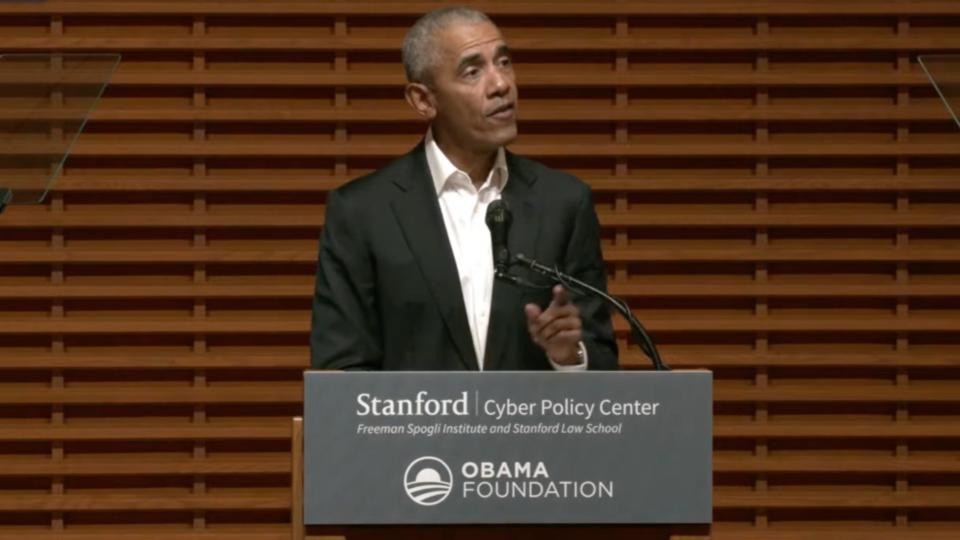April 2022 U.S. Tech Policy Roundup
Claire Carey, Kennedy Patlan / Apr 29, 2022Claire Carey and Kennedy Patlan are senior associates at Freedman Consulting, LLC, where they work with leading public interest foundations and nonprofits on technology policy issues.

April saw a number of newsworthy developments. The European Union (EU) arrived at consensus on the text of the Digital Services Act, while the European Parliament began considering the AI Act. In the United States, Elon Musk’s purchase of Twitter and President Obama’s Stanford speech on combating disinformation brought content moderation to the center of the public discourse.
There were also notable movements in the advocacy community surrounding antitrust legislation. Along with new legislation and policy engagement opportunities, the White House Equitable Data Working Group issued recommendations on data collection and use across federal agencies.
The below analysis is based on techpolicytracker.org, where we maintain a comprehensive database of legislation and other public policy proposals related to platforms, artificial intelligence, and relevant tech policy issues.
Content Moderation Takes Center Stage
- Summary: Between Twitter accepting Elon Musk’s offer to buy the platform for $44 Billion and President Obama laying out an agenda on combating disinformation, April saw a spotlight on content moderation and the role that private corporations, policy, and free speech play in it. News reports and advocacy also highlighted the prevalence of disinformation (including Russian efforts) impacting Spanish-language social media users. In the content moderation advocacy arena, Change the Terms, a coalition of organizations across civil rights, technology policy, and consumer protection, announced their “Fix the Feed” campaign. The new campaign pushes Big Tech to fix algorithms, protect people equally across all languages, and provide more consumer-facing disclosures surrounding business models and moderation.
- Stakeholder Response: Technologists and public interest advocates decried the dangers around Musk’s bid for Twitter and his plan to take the company private, specifically noting Musk’s intentions to alter or weaken current content moderation practices in favor of greater free speech. In announcing the deal, Musk stated that Twitter is the “digital town square” and he plans on “making the algorithms open source to increase trust.” Some observers expressed skepticism:
- University of Massachusetts at Amherst professor Ethan Zuckerman said, “It's embarrassing that we've been willing to have our public, civic conversations on platforms controlled by corporate boards. Musk's purchase of Twitter just makes that absurdity even more apparent.”
- Public Citizen president Robert Weissman said, “Having the world’s richest man own and have total control over one of the world’s most important communications platforms is a terrible and dangerous idea for democracy. That’s especially true when: a) the man in question has poorly developed ideas about how to operate the platform; b) his instincts seem to be to enable more authoritarian, racist and hateful posting; and c) he seems inclined to treat the platform as a personal plaything rather than public trust.”
- Harold Feld, Senior Vice President at Public Knowledge, noted that “Since 2019, Public Knowledge has advocated for policies that recognize the importance of digital platforms such as Twitter, and to regulate these platforms in the public interest. This includes the importance of protection against bullying and harassment, basic consumer protection against scammers and counterfeiters, protecting open public discourse -- including protection from the "heckler's veto" of trolls and extremists seeking to drown out dissenting views -- and rights of due process to correct errors and prevent people from gaming the system. These basic rights should not be dependent on the whims of whoever runs the platform. They are the responsibility of the platform in the same way that banks are subject to community reinvestment obligations, insurers are subject to regulatory oversight, and even taxi drivers are subject to basic rules of the road. It is well past time that we recognize that sector-specific regulation in the public interest of digital platforms is both justified and required.”
Twitter wasn’t the only social media platform drawing public attention and criticism this month: In response to Facebook’s handling of Spanish-language disinformation, 21 U.S. lawmakers wrote a letter to the company voicing their concern. Facebook spokesman Kevin McAlister said that the company was “applying labels to state-controlled media publishers'' and working to “remove content related to the war in Ukraine” that violates Facebook policies. Meanwhile, a leaked document suggests Facebook has little ability to regulate how its use of user data complies with privacy regulations such as the EU’s General Data Protection Regulation (GDPR).
- What We’re Reading: A Morning Consult survey on free speech and social media found that Democrats and independents were more likely to believe that they can express themselves on social media than Republicans. Axiosreported on Twitter’s Earth Day announcement, which formalizes the company’s actions against climate disinformation or “misleading advertisements that contradict the scientific consensus on climate change.” The Vergecovered President Obama’s keynote address about fighting disinformation at the “Challenges to Democracy in the Digital Realm” conference, whileThe Atlanticprovided reflections on his conversation with Jeffery Goldberg at The University of Chicago. Tech Policy Press highlighted Eric Goldman’s article Content Moderation Remedies that looks at alternatives to online content removals and provides a framework to navigate those alternatives.
Antitrust Advocacy
- Summary: Antitrust Day, a day of action featuring a broad coalition of public interest groups and companies working to advance antitrust legislation, took place April 1. This advocacy day involved over 66,000 emails to Congress, and 113 organizations and businesses supporting bipartisan antitrust legislation including the American Innovation and Choice Online Act (AICO) (S.2992 – Sponsored by Sen. Amy Klobuchar, D-MN), which would (among other provisions) make it illegal for online marketplaces to prioritize their products over the products of other companies, and the Open App Markets Act (OAMA) (S.2710 – Sponsored by Sen. Richard Blumenthal, D-CT), which would increase competition and choice in online app stores. On April 4, NetChoice led a counterpush day of action with 23 civil society and industry groups calling on Congress to oppose antitrust legislation, including the American Innovation and Choice Online Act.
- Stakeholder Response: Tim Wu, special assistant to the president for technology and competition policy, tweeted his support of the day of action. The Wall Street Journal reported that the Department of Justice sent a letter to leaders on the Senate Judiciary Committee in support of the American Innovation and Choice Online Act, saying it would enhance the ability of the DOJ and FTC to promote competition in digital markets. Meanwhile, Chamber of Progress, a trade group that represents technology companies including Google, Amazon, Facebook, and Twitter, sent a letter to the Justice Department urging them not to support either the American Innovation and Choice Online Act or the Open App Markets Act.
- What We’re Reading:Politicoreported that the Connected Commerce Council (3C), a lobbying group opposing antitrust legislation, listed small businesses who were unfamiliar with the organization as part of its membership directory. Bloomberg published a profile on Jonathan Kanter, the Justice Department’s Assistant Attorney General in the Antitrust Division, who spoke about his approach to the role. Fast Company provided a recap of this month’s Global Privacy Summit, which included keynotes from Apple’s Tim Cook and FTC Chair Lina Khan, who each presented their own antitrust stances. Gizmodo reported on Big Tech’s lobbying efforts against antitrust legislation.
Federal Equitable Data Recommendations
- Summary: On April 22, the White House Equitable Data Working Group released the report, A Vision for Equitable Data: Recommendations from the Equitable Data Working Group. The Equitable Data Working Group, formed in response to the Biden Administration's Racial Equity Executive Order and co-chaired by the Office of Science and Technology Policy and the Office of Management and Budget, is tasked with finding areas of improvement within federal data collection/use and creating a roadmap to increase access to data that measures equity. The Working Group’s new report highlights key actions the administration could take based on investments called for in the president’s 2023 budget and recommends that the federal government adopt the below five practices in order to achieve an equitable data vision:
- “Make disaggregated data the norm while protecting privacy”
- “Catalyze existing federal infrastructure to leverage underused data
- “Build capacity for robust equity assessment for policymaking and program implementation”
- “Galvanize diverse partnerships across levels of government and the research community”
- “Be accountable to the American public”
- Stakeholder Response: The Equitable Data Working Group met with more than 50 civil society and research organizations, representing underserved communities, to gain their perspective on what is needed for equitable federal data collection and use. The Working Group also took public input into account through the comments they received in OMB’s Request for Information on how public policy should be developed to advance equity in the use of data.
- What We’re Reading: The Leadership Conference Education Fund released a new report on "The Need for Better Federal Civil Rights Data Collection". They note that their recommendations emphasize those released by the White House Equitable Data Working Group.
Other New Legislation and Policy Engagement Opportunities
April saw less new tech-related legislation than previous months, but notable new proposals include:
- Warrant for Metadata Act (H.R.7553 – Sponsored by Rep. Ted Lieu, D-CA): This bill would require agencies to get a warrant in order to access “metadata” from providers of electronic communication services or remote computing services. The introduction of this bill comes on the heels of other recent attempts to advance surveillance reform like the Government Surveillance Transparency Act, a bipartisan bill that would require law enforcement to notify individuals whose digital information is being seized or surveilled.
- Notice of Open Meeting of the National Artificial Intelligence Research Resource Task Force: The National Artificial Intelligence Research Resource Task Force (NAIRRTF), the body tasked with “investigat[ing] the feasibility and advisability of establishing and sustaining a National Artificial Intelligence Research Resource,” holds regular meetings that are open to the public. NAIRRTF’s next meeting will be held online on May 20, 2022, where members of the task force will vote on approving their interim report to Congress and the president and will discuss plans for how to solicit public comment on the interim report.
Public Opinion Spotlight
Among other polls, this month we tracked public opinion around Big Tech’s power and antitrust policy:
- Variety and GetWizer Consumer Insights collaborated on a poll of 1,700 Americans, asking them about Big Tech’s role and influence. From January 18-24, Variety Key findings include:
- “Two-thirds of Americans think Big Tech wields too much power over the public”
- “A majority of respondents think that all constituent companies (Meta, Amazon, Google, Apple) all have too much power”
- “Two-thirds of Americans think the government should monitor Big Tech more closely”
- A survey conducted by the Institute for Local Self Reliance reached 908 small businesses across the United States, inquiring about the challenges small businesses owners face and policies they believe would improve the success of their businesses. The study found that:
- "62% said Amazon's control in the online marketplace was a very or extremely significant challenge.
- 58% claim a major challenge is the ability of big competitors to sell goods and services below cost.”
- The five policies cited as most effective are as followed:
- Breaking up and/or regulating Amazon
- Ending subsidies and tax breaks for big businesses
- Investing in downtowns and neighborhood business districts
- Capping credit card swipe fees
- Strengthening antitrust policy and enforcement
We welcome feedback on how this roundup and the underlying tracker could be most helpful in your work – please contact Alex Hart, Claire Carey, and Kennedy Patlan with your thoughts.
Authors

